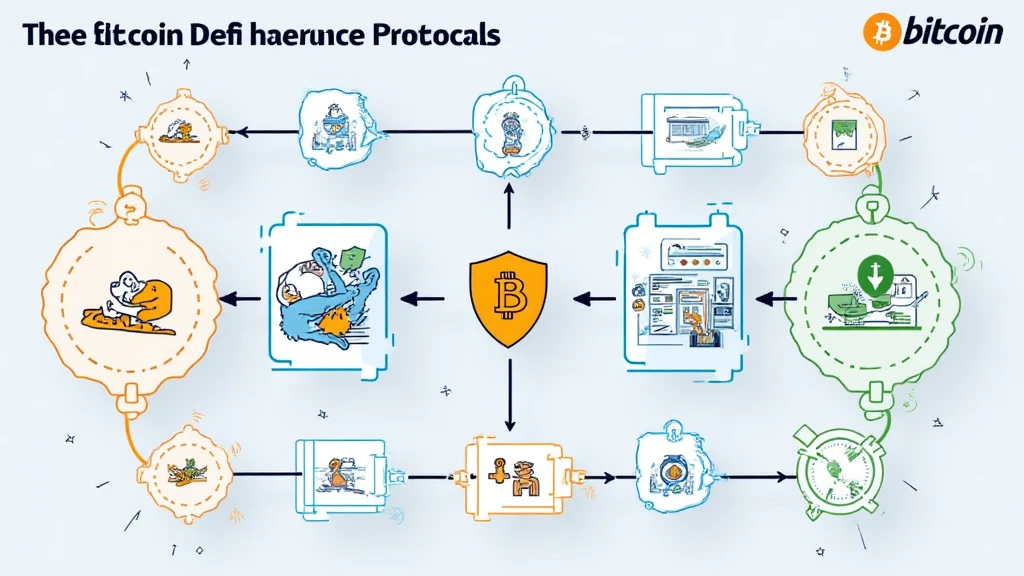
Unveiling Bitcoin DeFi Insurance Protocols: Safeguarding Your Digital Wealth
With the cryptocurrency sector experiencing an explosion of popularity, risks associated with decentralized finance (DeFi) platforms have surged, leading to significant losses from fraud and hacks. In 2024 alone, over $4.1 billion was lost to DeFi hacks, raising concerns about asset safety in a world where traditional financial systems are gradually being replaced by blockchain technologies. These concerns have led to the emergence of Bitcoin DeFi insurance protocols, aimed at providing crucial security in a precarious, unregulated environment.
This article delves into the various facets of Bitcoin DeFi insurance protocols, examining their operational mechanics, benefits, challenges, and future potential, particularly with the growing interest in the Vietnamese crypto market, where user growth has skyrocketed by 40% year over year. By the end, you’ll gain valuable insights into how these insurance solutions can safeguard your digital assets.
Understanding Bitcoin DeFi Insurance Protocols
Bitcoin DeFi insurance protocols offer a safety net for investors and users engaging with decentralized platforms. Much like traditional insurance that protects against unexpected losses, DeFi insurance protocols are designed to cover investors against financial risks posed by smart contract failures, exchange hacks, or other unforeseen incidents that can lead to asset loss.

In Vietnam, blockchain adoption is rising rapidly, with increasing numbers of local users transitioning to decentralized solutions while searching for reliable methods to defend their wealth. This context elevates the importance of understanding how Bitcoin DeFi insurance protocols work.
Key Features of DeFi Insurance
- Smart Contract Coverage: Most insurance protocols function through smart contracts that automate claims and payouts.
- Community-Driven Models: Many platforms operate on a peer-to-peer model, where participants contribute to a shared risk pool.
- Transparency: Blockchain technology provides transparent and public data, fostering trust in how funds are managed.
- Flexible Policies: Users can customize policies based on their needs, ensuring tailored coverage options.
The Role of Smart Contracts in DeFi Insurance
At the heart of Bitcoin DeFi insurance protocols lies the technology of smart contracts. Think of a smart contract as your digital vault, automatically executing terms when predefined conditions are met. This removes intermediaries, which are often points of failure.
For instance, if a user faces a financial loss due to a hack on a platform covered by an insurance protocol, the smart contract triggers a payout automatically without the need for lengthy claims processes. A prominent example is the insurance provider Hibit, which offers instant claims through efficient smart contract execution.
The Growth of DeFi Insurance in Non-Western Markets
As traditional financial systems often leave underserved populations at risk, many users in markets like Vietnam are seeking innovative ways to protect their digital assets. According to research, about 70% of Vietnamese cryptocurrency holders express concerns over security risks, highlighting the potential growth of insurance protocols in this vibrant market.
- Expanding Market: The Vietnamese cryptocurrency market is one of the fastest-growing in Southeast Asia, with a user base that reached approximately 5 million in 2023.
- Awareness and Education: Workshops and seminars are crucial in educating users about DeFi insurance options, fostering higher adoption rates.
Challenges Faced by DeFi Insurance Protocols
Despite their potential, Bitcoin DeFi insurance protocols face numerous challenges that could hinder their effectiveness:
- Complexity: Many users find understanding the intricacies of DeFi insurance daunting, resulting in underutilization.
- Regulatory Uncertainty: The lack of clear regulations can create apprehension among potential users.
- Market Volatility: Rapid price fluctuations can impact the viability of risk pools within insurance protocols.
Real-World Examples of DeFi Insurance Protocols
Several Bitcoin DeFi insurance protocols have emerged as leaders in the industry:
- Nexus Mutual: A pioneer in the space, Nexus Mutual allows users to pool funds to insure against smart contract failures.
- Cover Protocol: Focused on user-friendliness, Cover Protocol simplifies the process of obtaining coverage.
- InsurAce: Offering comprehensive coverage options, InsurAce provides users with diverse choices tailored to their needs.
The Future Potential of DeFi Insurance Protocols
Looking ahead, Bitcoin DeFi insurance protocols are poised to play an increasingly vital role in protecting assets as the DeFi ecosystem continues to broaden. With a projected increase in the number of participants in the Vietnamese crypto space, we may see the following trends emerge:
- Increased Adoption: As users become more educated about their options, adoption rates for insurance protocols are expected to surge.
- Integration with Traditional Finance: Bridging the gap between DeFi and traditional finance could drive broader acceptance of these insurance products.
Regulatory Considerations in the Vietnamese Market
For Bitcoin DeFi insurance protocols to thrive, regulatory frameworks must evolve alongside technological advancements. In Vietnam, the government is beginning to pay closer attention to cryptocurrency regulations, which may impact how insurance products are structured and offered.
Examples of compliance practices include:
- Incorporating mandatory reporting for insurance claims.
- Ensuring adherence to local financial regulations to foster trust.
Final Thoughts on Bitcoin DeFi Insurance Protocols
As the decentralized finance landscape expands, understanding Bitcoin DeFi insurance protocols becomes crucial for safeguarding digital assets. With the right knowledge and tools, investors can mitigate risks and navigate the evolving environment confidently.
Whether you’re a seasoned investor or new to the crypto space, staying informed about these protocols will enhance your ability to protect your wealth in a rapidly changing environment. With increasing user engagement in Vietnam, there has never been a better time to explore how DeFi insurance can secure your digital assets.
To remain updated about Bitcoin DeFi insurance protocols and other facets of the cryptocurrency market, check out btcmajor for resources and insights.
Written by Dr. Minh Nguyen, a blockchain security expert with over 15 published papers on decentralized finance and a key auditor in various recognized projects.







